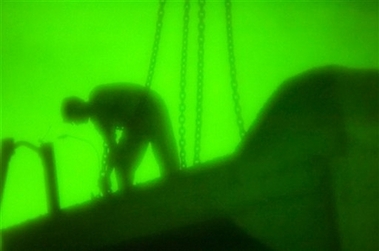72个伊拉克人被杀
 In this photo released by U.S. Army, an Iraqi contractor attaches chains to a concrete barrier so that a crane can lift it into place alongside a road in the Sunni Muslim quarter of Azamiyah, Baghdad, Iraq, Tuesday, April 10, 2007. [AP] |
BAGHDAD - Gunmen shot and killed 23 members of an ancient religious sect in northern Iraq on Sunday after stopping their bus and separating out followers of other faiths while car bombings in the capital killed at least another 20 people.
Iraqi Prime Minister Nouri al-Maliki, in Egypt to drum up support among Arab leaders for his Shiite-led government, told Egyptian President Hosni Mubarak that Iraq was not embroiled in a civil or sectarian war. Key Arab leaders pressured him to step up reconciliation efforts to include Sunni insurgents if he expects Arab support.
In the northern Iraq attack, armed men stopped the bus as it was carrying workers from a textile factory in Mosul to their hometown of Bashika, which has a mixed population of Christians and Yazidis - a primarily Kurdish sect that worships an angel figure considered to be the devil by some Muslims and Christians.
The gunmen checked the passengers' identification cards, then asked all Christians to get off the bus, police Brig. Mohammed al-Wagga said. With the Yazidis still inside, the gunmen drove them to eastern Mosul, where they were lined up along a wall and shot to death, al-Wagga said.
After the killings, hundreds of angry chanting Yazidis took to the streets of Bashika in protest. Shops were shuttered and many Muslim residents closed themselves in their homes, fearing reprisal attacks. Police set up additional checkpoints across the city.
Bashika is about 80 percent Yazidi, 15 percent Christian and five percent Muslim.
Abdul-Karim Khalaf, a police spokesman for Ninevah province, said the executions were in response to the killing two weeks ago of a Yazidi woman who had recently converted to Islam after she fell in love with a Muslim and ran off with him. Her relatives had disapproved of the match and dragged her back to Bashika, where she was stoned to death, he said.
A grainy video showing gruesome scenes of the woman's killing was distributed on Iraqi Web sites in recent weeks, but its authenticity could not be independently confirmed.
In Baghdad, two suicide car bombs exploded within moments of each other in Baiyaa, a mixed Sunni-Shiite area in the western part of the capital. The first driver raced through a police checkpoint guarding the station and exploded his vehicle just outside the two-story building, while the second bomber aimed his explosives at the checkpoint's concrete barriers, police said.
The blasts collapsed nearby buildings, smashing windows and peeling back metal roofs. A man who was among the 82 wounded in Sunday's attack staggered through the wreckage.
"All our belongings and money were smashed and are gone. What kind of life is this? Where is the government?" he asked. "There are no jobs, and things are very bad. Is this fair?"
Iraqi police stations often are the target of attacks by insurgents who accuse the officers of betraying Iraq by working in cooperation with its U.S.-backed Shiite government and U.S. military.
Police said 13 people died - five policemen and eight civilians. The wounded included 46 policemen and 36 civilians.
Elsewhere in Baghdad, a parked car bomb exploded in the Sadiyah neighborhood, killing seven civilians and wounding 42, police said. A roadside bomb then struck a police patrol coming to check on the blast, killing one officer and wounding two others.
In all, at least 72 people were killed or found dead in Iraq on Sunday, including 24 bullet-riddled bodies and two brothers who were shot to death in the volatile city of Fallujah, a day after the chairman of the city's council was assassinated.
The U.S. military also reported the deaths of three soldiers. Two were killed in attacks in Baghdad on Saturday, while the third died from an unidentified non-combat cause that was still under investigation, the military said.
In Cairo, Al-Maliki met with Mubarak for about 45 minutes and later held talks with Prime Minister Ahmed Nazif.
The visit came 10 days before two conferences on Iraq will be held in the Egyptian Red Sea resort of Sharm el-Sheik. They will be attended by Iraq's neighbors as well as Bahrain and Egypt, and the five permanent members of the UN Security Council - the United States, Russia, China, France and Britain - and other members of the Group of Eight industrialized nations.
Al-Maliki won't attend those meetings but is lobbying for more help from the mostly Sunni-led governments of the Arab world in stopping violence in Iraq.
"It was a positive and comprehensive meeting and we discussed the problems in Iraq. I clarified to the president the reality of what is going in Iraq, which is not a civil or sectarian war," al-Maliki said during a joint news conference with Nazif.
Arab diplomats, speaking on condition of anonymity because of the sensitivity of the talks, said al-Maliki was told that Arabs will link their support to a package of demands before they give substantial help to his fledging government.
The Sunni-led governments of the Arab world have long been suspicious of Iraq's Shiite leadership, blaming it for fueling violence by discriminating against Sunnis and accusing it of helping mainly Shiite Iran extend its influence in the Middle East.
On Sunday, al-Maliki announced that he had ordered a halt to a barrier being built by the U.S. military that would separate a Sunni enclave from Shiite areas of Baghdad. The wall had drawn sharp criticism from residents and Sunni leaders who complained it would isolate the community.
Al-Maliki also promised to introduce new legislation to let former members of Saddam's ruling Baath Party resume jobs in the government. The legislation, which has yet to be sent to parliament, was seen as an attempt to avert criticism at the Arab summit.




 手机网站
手机网站